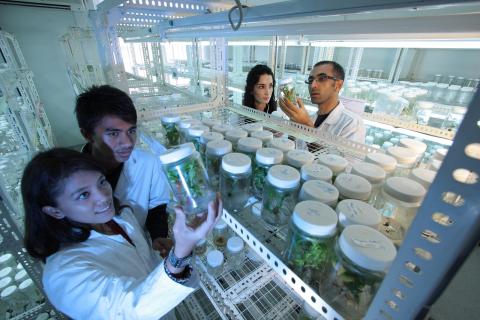A report analyses the level of scientific populism in Spain for the first time
The Spanish Foundation for Science and Technology (FECYT) has produced a report that compiles the results of a pioneering survey in the country on populist attitudes related to science. The research explores, among other issues, the consumption of scientific information, public perceptions of the role of science in politics and society, the benefits of science, attitudes towards technologies such as vaccines and issues such as climate change.

Ana Muñoz van den Eynde - populismo científico EN
Ana Muñoz van den Eynde
Head of the Science, Technology and Society Research Unit at CIEMAT
I think it's a very interesting and necessary study and I'm glad to hear that Spain has participated in the TISP project. The report provides mainly descriptive results, but it would be very interesting if it could be complemented with studies to explain the results and try to understand what lies behind all the information gathered. For example, the study detects a lack of confidence in the government's actions in relation to climate change, but, in a context of extremely high political polarisation such as the one we find ourselves in, I wonder if the responses really have to do with climate change or if they are, in reality, an opinion about the government's actions in general.
I find the gap between the population's priorities regarding what science should investigate and the perception of what the priorities of scientists are striking. I think this gap is significant and suggests that society's relationship with those who dedicate themselves to science is complex and not as positive as other questions seem to reflect. This is proof that the image we obtain depends largely on what we ask and how we ask it.
On the other hand, it also shows that health is a fundamental concern for society; however, science cannot only be dedicated to research in that area. I would have liked to see what happens if reference is made to ‘basic science’, to see if the population prioritises applied research. On the other hand, I was surprised to see that people believe that defence research is a priority for science.
With regard to the questions measuring the relationship between science and politics, which are new and highly relevant at a time like the present, when there is an insistence that science should contribute to defining public policy, the results provide additional evidence of another important gap, that between support for the use of scientific knowledge in policymaking and the connection between science and politics. That is to say, people seem to want scientific knowledge to be taken into account, but they do not seem to want those who dedicate themselves to obtaining it to have any connection with politics. This seems worrying to me because it makes me think that the population continues to conceive of scientists as distant people, on the margins of the real world, with whom they should not have any connection so as not to be ‘corrupted’. And this seems worrying to me.
At the same time, people seem to agree with contradictory statements. For example, the pattern of responses to agreement/disagreement with the statement ‘Scientists should be more involved in the public policy-making process’ is very similar to that of the statement ‘Scientists should remain independent of the public policy-making process’, when they should be the opposite.
On the other hand, the average of the responses on a scale of 1 to 11 to the statement ‘Scientists should only communicate certain results’ is 7.6. I find this result interesting and worrying at the same time. I think it reflects three issues. First, the population's difficulties, evident during the pandemic, in accepting that science offers provisional results and is built up as it goes along. It is worrying because it seems to indicate that science is expected to provide certainties, and is accepted to the extent that it can do so. Secondly, because it reflects the population's ignorance of the nature of science. This result coincides with some of the studies we have carried out in the Science and Society Research Unit (UICTS) of Ciemat in which, for example, we found that the phrases ‘Science makes mistakes’ or ‘The answers provided by science are provisional’, contrary to what we had anticipated, only fitted into the proposed models if we included them as indicators of a negative attitude towards science. Thirdly, the difficulty in accepting that science often has to provide evidence in contexts of great uncertainty in which, moreover, the risks are high and the decisions difficult (such as the one that constituted the pandemic). If the population does not accept this, we will find ourselves in trouble again in an equivalent situation. And we cannot forget that populism, including populism related to science, feeds on the confusion and anxiety of the population in situations of uncertainty.
Finally, the average score on the same scale of 1 to 11 for the sentence ‘Scientific research only serves to enrich the pharmaceutical companies’ is 4.6. Fortunately, it is not very high, but it is not negligible, and it also has an impact on some of the results obtained by the UICTS. I think it refers to the concern about what we can call instrumental science, aimed at making profits. And the attitude towards this type of science is essentially negative.
- Report
- People



